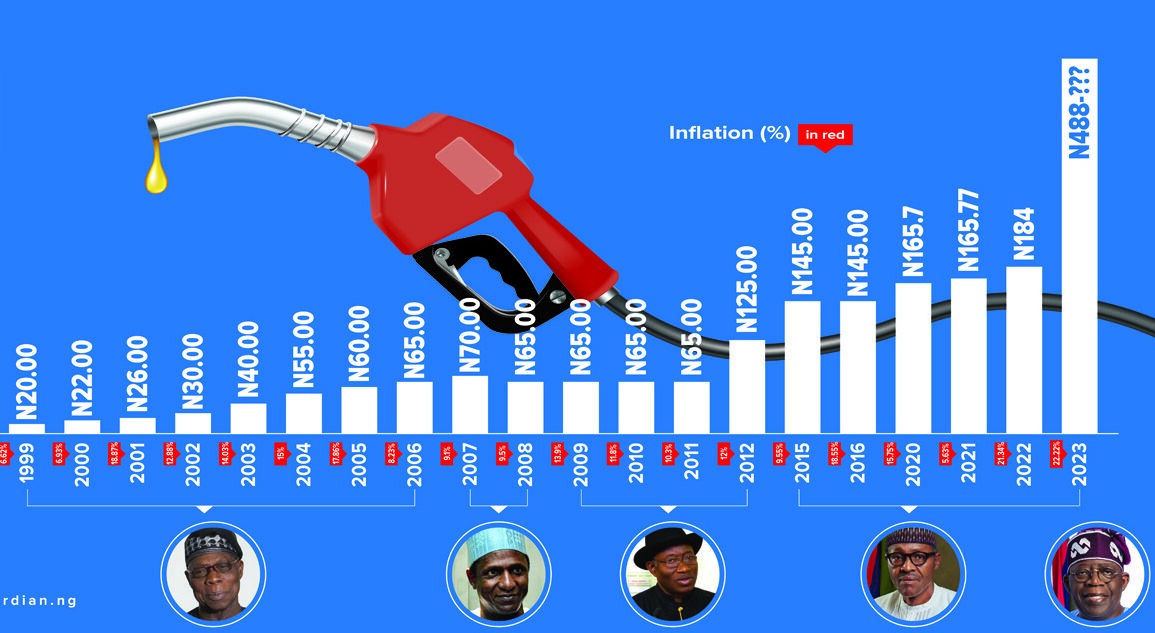There is no gainsaying the fact that Nigerians are in for a very hard grind, occasioned by the precipitous removal of subsidy on petrol by President Bola Ahmed Tinubu in his inaugural speech on May 29.
The effects on life and living have been direct and instantaneous, sending prices of just about everything through the roof, and into the sky. I am of the bent that Mr. President had not done sufficient homework on subsidy removal. It is now clear that the shock effects of this major policy proclamation, coupled with the rationalization of the foreign exchange market, had been hugely underestimated by the President.
In the first instance, if proper diligence had informed the decision to remove subsidy, the rippling shock effects would have been anticipated and proper steps taken to mitigate them, rather than falling back on an ineffectual palliatives regime that will not even get to the desired targets. We need not have been in a hurry to remove the subsidy, though there is national consensus on the removal. But we could have had a graduated removal plan. From N165 per litre, we could have moved to N200 for the month of June, then N250 or N270 for July, and so on till we got to the previous N488.
In discussing this, there are people of the opinion that the only way Mr. President could have done it is the way he did it, especially because there was no provision for subsidy beyond June in the budget. I counter this by saying that there are instruments that the president could always fall back on, such as the use of supplementary budgets and executive orders. In any case, if the Finance Act put in place by Buhari could be suspended by Tinubu, then it means there is wide latitude by the president to deal with issues around subsidy.
Trailing the subsidy removal is the issue of palliatives. The Buhari administration had secured a World Bank grant of US$800 million to be spent on palliatives to cushion the effects of subsidy withdrawal, but had very little time left to implement conditionalities for its draw-down. And when I checked, we will have to put in place a brand new bureaucracy to administer the palliatives, which will cost some US$57 million. That is not even the problem.
The issues are around a government offering of N8,000 per month, for six months to 12 million poor and vulnerable families. People in government cannot tell me that they don’t know that a register of 12 million poor families in Nigeria does not exist. They also know that N8,000 cannot do anything for anybody, poor or rich, in Nigeria today, beyond one day. What then is the basis of N8,000 for one month?
I am happy that the President demonstrated that he has an ear to the ground by ordering a review of the palliatives offering. N8,000 will just be a spit in an ocean, and will not have any impact. What is more, government should jettison completely the idea of cash transfers, conditional or not. Giving cash to people is the same as giving people fish to eat. It is possible to teach them how to fish, and that is what government should work towards.
All these were about when the price of petrol was N488 per litre. Now that the price ranges from N568 to N617 and more in various parts of the country, the previous palliatives offering have been rendered ineffective. In fact, the palliatives themselves need palliatives. The president has sent a bill to the National Assembly seeking amendments to the Supplementary Budget Act, and indeed, proposed, among others:
N500 billion for palliatives and other capital expenditures to cushion the effect of the recent subsidy removal policy;
N185,236,937,815 to the Ministry of Works and Housing to alleviate the impact of the severe flooding experienced in the country in 2022 on road infrastructure across the six geopolitical zones;
N19,200,000,000 to the Federal Ministry of Agriculture to ameliorate the massive destruction to farmlands across the country during the severe flooding experienced last year;
N10 billion to the Federal Capital Territory Administration for critical projects; and
N70 billion to the National Assembly to support the working conditions of new members.
There you have it. The last item is actually the one that rankles and is riling my Ijebu corpuscles. The sum of N70 billion is appropriated “to support the working conditions of new members.” That is the 21st century equivalent of the Udoji Award of the 70s. Nearly 80 per cent of the 469-man National Assembly did not return.
That means that N70 billion from the national exchequer is to be spent on some 300+ people. What are these working conditions? Another example of rapacious profligacy at a time when the rest of us are more or less groaning and slaving to get just a meal. If that is the way this government will spend money, better to bring back the subsidy. That would be the only way we are assured we are getting something from our government.



